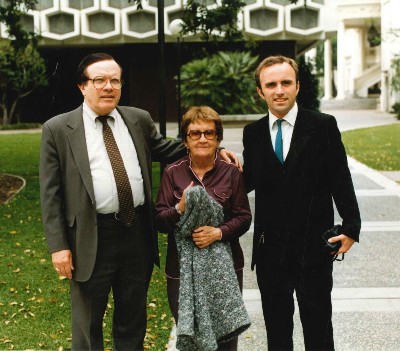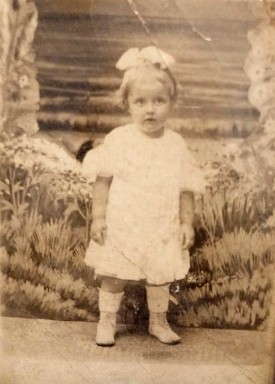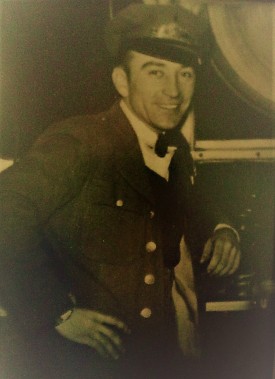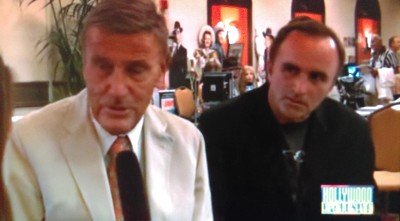Through Pandemics and Personal Issues Mom Soldiered On…
By Alan Doshna
 Don, Vera and Al at former Ambassador College (Pasadena) grounds in 1980s. Photo courtesy of Gary Glasford
Don, Vera and Al at former Ambassador College (Pasadena) grounds in 1980s. Photo courtesy of Gary GlasfordTo all appearances, the James (Jim) McEnroe family, including five daughters, was a normal family living in the New York City suburb of Yonkers, NY at the early part of the twentieth century. Yet time and place would put them in the proximity of some interesting personalities as well as tragic and momentous events. Hers was truly “a life in the times” worth recalling.
A daughter, my mother, Veronica (Vera) McEnroe, was best friends with Margie, daughter of famed bootlegger Owney Madden. Notorious for underworld activities, Madden ran the Harlem-based Cotton Club which gave a platform to some of the soon to be iconic musicians of their time such as Duke Ellington and Louis Armstrong. He was portrayed by Bob Hoskins in the film The Cotton Club. Jim, who worked at the prominent Yonkers Meat Market, came to know Malcom Wilson, who would be a mourner at his funeral and later become Governor of New York in the mid-1970s. Interesting neighbors indeed!
The Plague Years
However, the Spanish influenza of 1918 would claim the life of the family's only son. Mom (Vera) would tell me how, just a child herself, she saw her grieving family hold the child's lifeless body and tell him to "Wake up!" The family was devastated and their mother would require assisted care away from the home for the rest of her life. Although the sisters were a tight-knit group, Vera's independent spirit often put her in conflict with her sisters, generating arguments and requiring Jim to scold "That'll be enough of that!"
In her teens, Vera, a petite dark blonde, resembled an ingenue-era Bette Davis (who, not surprisingly, would become her favorite actress) with compelling green eyes and a soft voice with a slight New York accent. She would sometimes reminisce how young guys would show off in front of her on the basketball court. Even in her later years, I could see how she could have "tough guy" friends and family acquaintances "eating out of the palm of her hand" with her endearing personality, often likened to the cartoon character Tweety Bird.
One of her young male admirers was Frank who, a bit older than her, was a generous and responsible if paternalistic young man of Slovakian background. Seeing this as her best option out of a problematic, motherless family situation she married Frank in her late teens. Problems quickly arose, however, when Frank unilaterally moved them to his parents' upstate NY farm, against the wishes of Vera, a city girl through and through.
 Little Vera at Coney Island – a period piece of when New York State was the place to be.
Little Vera at Coney Island – a period piece of when New York State was the place to be.Struggling Through
Although over their twenty-year marriage Vera and Frank would have two sons, Don and Frank, Jr. with both good looks and good character, the strain of acutely differing goals and outlooks would take their toll. On her evening ride home on the trolley from her job at Frank's coffee shop, she would come to be familiar with the driver – John, a handsome, sharp looking man in his conductor uniform. What started as dropping her off at her doorstep in his car at the end of the line led to dinner-dates where, later recalling, she would be so enthralled to be with him that she couldn't finish her food.
Although warned by her father about John's "Jekyll and Hyde" personality, Vera would leave Frank for the unreliable and uncertain comfort of John's arms. She would later bear two children by him, my brother Walter and myself. For years, in and out of court, she struggled to make ends meet and provide for her two semi fatherless sons. Having had me when she was in her forties, I had both health and emotional difficulties due no doubt to her being significantly past child bearing age. At two years old, living in a poorly heated apartment I caught pneumonia from which I was not expected to recover. Asking the attending physician if I would survive, he would turn away and not answer her.
Although she would be forbidden to return to the Catholic Church or to receive Communion, after visiting me at the hospital in the evenings she would go to the church to light candles and pray for my recovery. And then suddenly, like a miracle, which she frequently reminded me about in my early years, I began to get better and better. Over time this would result in a less than ideal dependency on both sides. She was my eternal advocate, going to war with teachers, store clerks, neighbors over their complaints about the misbehavior of her sickly little boy.
One of her main problems was getting me to eat, as nothing seemed to appeal to me, so I would refuse. This led her to taking me to luncheonettes or pizza parlors or wherever, to indulge me in whatever I happened to have a taste for at the moment. This would include mushroom soup and pizza, then buying me packs of Beatle trading cards and letting me play my favorite song of theirs, (“There's A Place”) on the juke box over and over as a kind of maternal bribery.
Even at this young age, however, I realized that my mom was older than those of other kids my age and that although I needed her more than anything, I knew that my normal natural lifespan would be spent without her, creating even more anxiety.
 John Doshna of Yonkers in his trolley uniform.
John Doshna of Yonkers in his trolley uniform.Brotherly Love and Rose Kennedy
Then my brother Don, who, unlike Frank Jr., was still single, decided to take us under his wing and live up to his godfatherly promises by providing for us. Although it was a bitter pill for us to swallow, Don was offered a better job at the Small Business Administration where he worked, which required us to relocate to the semi-rural Syracuse, NY, a challenge but an unquestionable blessing to us all.
In spite of her misgivings, Vera flourished in this turn of events in a number of ways. Like many New Englanders, an admirer of all things Kennedy, she seemed to channel matriarch Rose in holding her family close to her at a distance, as a kind of a blue-collar version of the Kennedys of Hyannis Port. Like Rose she hit the genetic lottery in terms of the good looks of all four of her sons in their prime…or so we were often told. However her earlier mistakes would limit her options for a personal life on her own terms – a reality she courageously and doggedly embraced.
As time went on however, the possibility of her remaining sons leaving the nest created problems. If Don were to get married, the three of us would be in danger of going back to Square One, subject to the demands of another woman in the picture. For us boys, then, courtship and marriage remained a basically forbidden subject. I did begin a dating a girl in college under pressure from her own family. Sensing desperation on all sides I reached out to a radio preacher whose churchly views were just what I needed at the time. All this was much to my Irish Catholic mother's dismay: she had never given up on her basic beliefs. Even worse for our relationship I then relocated to Los Angeles to pursue a career as an actor.
 Al makes good: posing with Six Million Dollar Man co-star Richard Anderson.
Al makes good: posing with Six Million Dollar Man co-star Richard Anderson.“Unconditional Love”
It was then that I learned unconditional love as I had never before, both from my mother and brother Don. Although they had their own rocky times they were always willing and able to help me out financially from a distance in spite of my having chosen two paths that they opposed. This unstinting support would continue to the end of both of their lives.
Knowing, as I did from a young age, that I would not have my mother for very long in my life, I then tried to show my appreciation for them both, in word and deed, particularly for my mom and eventually ended up caring for my brother Don in his declining years. There’s truth in the old saying “blood is thicker than water.” Although I miss both of them very much, I have felt the presence of God in my life in His and their care for me and also the faith and certain assurance that in due and proper time, we will be reunited in His love.
Then the circle won’t be broken.